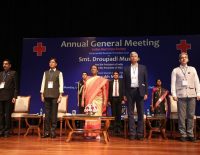Health ministry launches 100-day campaign to reduce TB incidence and mortality

As the centre on Saturday launched a 100-day intensified nationwide campaign to reduce the burden of TB incidence and mortality across the country, Prime minister Narendra Modi said the fight against TB has got stronger. He said this special 100-day campaign is starting today with a focus on the high burden TB districts.
“Our fight against TB just got stronger! Powered by a collective spirit to defeat TB, a special 100 day campaign is starting today with a focus on the high burden TB districts. India is fighting TB in a multi-pronged manner with: Doubling support to patients, Jan Bhagidari, Newer drugs and Use of tech & better diagnostic tools. Let us all come together and do our bit to eliminate TB”, said Mr Modi in a post on X.
Inaugurating the nationwide campaign in Haryana’s Panchkula, union health minister JP Nadda said the rate of decline of tuberculosis incidence in India has doubled since 2015 and is ahead of the global average. The 100-day TB elimination campaign will be implemented in 347 districts of 33 states where the prevalence of the disease is higher. The campaign is focused on enhancing detection, reducing diagnostic delays and improving treatment outcomes.
“Under this programme, we have taken detection, tests, treatment and supportive strategies forward in an accelerated way. I feel this 100-day programme will prove to be a milestone in making a ‘TB-mukt Bharat’ and it will have a far-reaching impact,” Mr Nadda said.
Recalling the nation’s struggle and fight against tuberculosis saying that at one time TB meant a ‘slow death’, the minister said, “Even family members suffering from TB were isolated to prevent its spread. Since 1962, there have been many campaigns against tuberculosis, but in 2018 the prime minister put forth a vision to end TB much before the 2030 deadline of the Sustainable Development Goals.”
“We changed strategies to achieve the aim. Services have been decentralised and now, 1,73,000 AAMs (Ayushman Arogya Mandirs) will have the facilities to detect and treat tuberculosis,” he continued.
Mr Nadda highlighted that the rate of tuberculosis incidence decline in India has doubled from 8.3 per cent in 2015 to 17.7 per cent now, which is much ahead of the global average. Deaths due to tuberculosis have also reduced significantly in India by 21.4 per cent in the last 10 years. He said the government has now made it mandatory for even private practitioners to notify any new tuberculosis patient so that their treatment can be followed up immediately.
The 100-day campaign underscores the Union government’s commitment to achieving the goal of end-TB by addressing the challenges of tuberculosis notification and mortality in India under the National TB Elimination Programme of the health ministry.
Some of the key focus areas of the campaign are increasing access to advanced diagnostics, targeted screening among vulnerable groups, specialized care for high-risk individuals, and provision of expanded nutritional support.
Speaking about Haryana, the minister said earlier, there were only six medical colleges and now the number has grown to 15. The Haryana chief minister has announced the opening a medical college in each district, he said.







